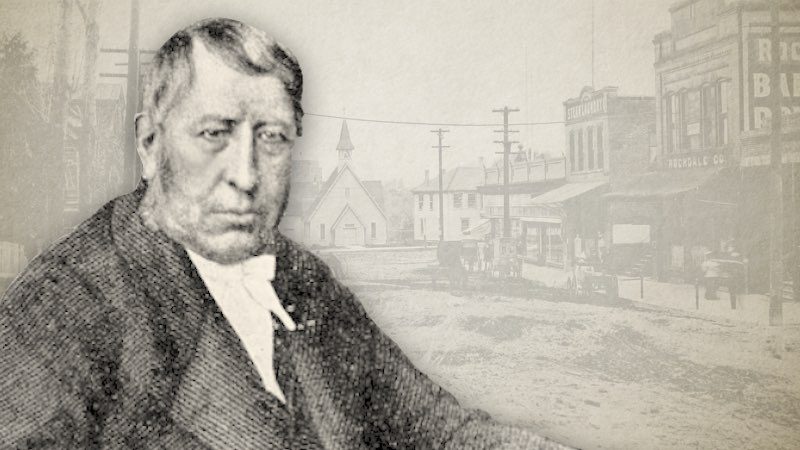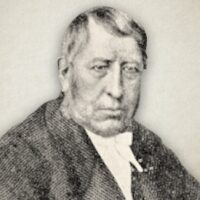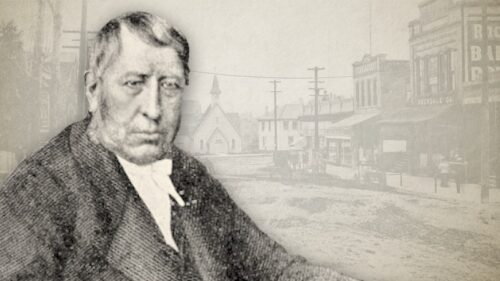
Christ’s Sheep, And Their Marks
Notes of a Sermon preached on 11 April 1843
“I give unto my sheep eternal life, and they shall never perish.”—John 10:28
The Holy Ghost, in the canon of Scripture, has borrowed a variety of metaphors from natural things to show us what Christ is to his people, and what his people are to him. Here he calls them “sheep,” and himself the “Shepherd.”
Jesus has received his sheep from his Father’s hand as his portion, as the lot of his inheritance. He knows his sheep intimately and perfectly. When they are wandering on the mountains of the Adam fall, the shepherd has his eye upon them, and he seeks them out, and calls them to the rest of his flock, in his own time.
I. The dead state the sheep of Christ are in with the rest of the world by the Adam fall.
All mankind, living in the loins of Adam, fell when he fell, their great federal head and representative: “As in Adam all die.” We want no proof of this if we look around us. Not only the openly profane, but how many of the professing world are still “dead in trespasses and sins.”
An outward form of religion serves as a cradle for the devil to rock the soul to the sleep of death. “There is death in the pot.” The true sheep are living sheep and want living pasture. David was one, and he says in an ecstasy of joyful remembrance: “He leadeth me into green pastures, and beside the still waters.”
II. None can give life to the dead but Christ.
“Thou hast given him power over all flesh, that he should give eternal life to as many as thou hast given him.” He will never give eternal life to a goat, and never let one sheep pass through the world without it.
There are many kinds of life—vegetable life. Sometimes I see many beautiful flowers, but there is no savour, no smell, no life in them; they are artificial. Where is he that can give life to a blade of grass? There is none. There is the life of brutes; but none can give a worm life. There is our own natural life. What was Adam when he came from his Maker’s hands? A lump of clay—no sense, no feeling. Did he leave it so? If he had it would soon have returned to its own dust again; but “he breathed into him the breath of life, and man became a living soul.”
Sinners, dead in trespasses and sin, lie in sin as in a grave, and have no more power to rise than a dead carcass, and nothing but the sovereign power of Christ can effect it. This truth is borne out by the experience of every true Christian.
God’s quickened family feel a great deal of deadness. My brother, cannot thou raise thy soul above this poor world, and fix thy soul on spiritual things? Oh no! your language is, “My soul cleaveth unto the dust: quicken thou me according to thy word”; and you are constrained to feel, “My springs are all in thee.”
III. The evidences and marks of eternal life in the soul.
1. Before the sinner is quickened he can live in sin, and enjoy it as much as sin can give joy; but not so with the living soul.
God has put his fear in his heart that he cannot sin against him (but with grief). ‘Tis a burden. ‘Tis bitter. God says, “Come out from among them, and be ye separate, and touch not the unclean thing.” “What doest thou here, Elijah?”
The poor soul tries to defeat the Lord, and says, “Go away now. At a more convenient season I will send for thee”; but it is of no avail, for “he works in him to will and to do of his own good pleasure.” I used to curse my father for taking me to the prayer-meeting, when I hated the Bible, and I do declare before God that I should have gone on to this day, and at last been damned but for the sovereign, almighty, electing love of Christ.
2. He begins to cry.
God’s living family often pray when they do not think they do; they mourn, they sink, and groan till they seem full of sighs, and the devil cannot smother them.
3. They become as little children.
What is it to become as a little child? Ezekiel describes it as a newborn babe cast out in a wilderness, unwatched, unwashed, unclothed. How weak! how helpless! how indigent! What can it do for itself? Nothing but cry and wait; and what can you do for yourselves more than this child? Can you wash yourselves, clothe yourselves, feed yourselves? “Except ye become as little children, ye shall not enter into the Kingdom of heaven.”
4. Living souls are hungry and thirsty.
A dead man neither hungers nor thirsts, but a quickened soul longs for the bread of heaven, for the means of grace, for gospel food. Before a sinner is made alive he can go on without the Bible; aye, the Bible is no book for a dead soul.
Here is an anecdote to show how living souls must have the means of grace. There was an old man in the north, and his name was Penderderry. This man had been what he called a churchman for seventy years, though the only time he had been to his parish church was when he was married, and when any of his children were christened. Now in the same village there were some of the Lord’s living sheep, and they asked a good man to come and preach to them. Well, some of the neighbours asked this old churchman to go and hear, but, “No,” said he, “I’ll na gang near they dissenters.” However, when the day came, one asked him as a favour to himself to go and hear; and at last the old man said, “Well, ye’re a good naibor, and so to please ye I’ll gang.” He went, and the good man took for his text, “Thine arrows are sharp in the heart of the king’s enemies, whereby the people fall under thee.” (Psa 45:5) The good man drew his bow at a venture, but the Lord directed the shaft. When the old churchman went home, he sat him down by the fire, and his head was down, and his wife said to him, “What’s to do wi’ ye?” The old man told her that he had heard things at the meeting that would not let him be easy. “Thou shalt gang na mare, thou shalt gang na mare,” said his wife. The good man preached again, and the old churchman went again, and God wrought more upon him this time than he had before, and he went home and sat him down as before. Well, after he had sat some time, said he to his wife, “I would someone would rout me aut a Bible.” His wife went into the 1oft and there found his old Bible, and wiping the dust off with her apron, brought it to her good man. Well, he read and read, and at last said, “Is this the right auld Bible we used to have?” “Aye, sure it is,” said his wife; “we’ve got na ither.” “I see how it is,” said the old man. “I see how it is, I’ve got nae een [new eyes].”
Quickened souls cannot live in the neglect of the means of grace.
In giving eternal life, Christ gives himself. Wherever life is in the soul, there Christ is: “When Christ, who is our life shall appear.”
Renewed souls can only thrive on a living Saviour. O! soul, can you live on your studies? If so, you don’t know what it is to feed on Christ. “Should do,” “ought to do” and “will do” are the husks that the swine do eat; but whoso hungers and thirsts after righteousness will say, “There is bread enough in my Father’s house (for Christ is there, and he is the true bread), and I cannot live on this swine’s food.”
5. The assurance given.
I’ve no time to enter on this boundless part of the subject, but just ask how do matters stand between God and your soul? Are you alive? Can you be satisfied with outward forms, the swine’s husks? If you can, there is no sign of life in you. But can you feed on Christ alone? Are you satisfied with nothing else? If so, Christ has given you, as one of his sheep, “eternal life, and you shall never perish.”
John Kershaw (1792-1870) was a Strict and Particular Baptist preacher. He was appointed the Pastor of Hope Chapel, Rochdale, serving this position for fifty-three years. John Hazelton wrote of him:
“His autobiography is one of the best books of its kind and one striking incident we will quote. It is his account of his interview in Edinburgh with Dr. John Duncan, often called "Rabbi" Duncan, because of his profound knowledge of Hebrew. Dr. Duncan (1796-1870) was Professor of Hebrew in New College, Edinburgh, and was a man of the most acute and profound intellectual powers, and at the same time a deeply spiritual and Scriptural preacher. In learning and associations he was at the antipodes of plain John Kershaw. In November, 1861, Mr. Kershaw preached in Edinburgh, arrangements having been made through Lady Lucy Smith, who was desirous that his original and powerful ministry should be exercised there. He writes:—"Another of my visitors was Dr. Duncan, who I was told by one of the ministers understood fourteen languages and that there was only one in the City who surpassed him in learning. He told me he had heard me preach three sermons, and he quite agreed with me in every statement that I had made, both in doctrine, experience and practice, save one, and that I had not fully entered upon, namely, 'the extent of the call of the gospel.' He candidly told me that his human learning had for years past been a great hindrance to his coming to a saving knowledge of the truth, and he had proved Paul's words, that the world by wisdom knew not God; and referring me to 1 Cor. 1:21,22 said he was for a long time like a wandering star or a ship at sea without a compass, ready to settle in every 'ism'—sometimes Arianism or Socinianism; and sometimes his mind was bordering upon infidelity. He declared himself much ashamed of many of his theological productions. When it pleased the Lord to work in his soul by the power of the Spirit he was for a long time in a distressed state, not knowing what to do to get peace and comfort. A conversation with another minister was made useful to him and he was enabled to go to the feet of Jesus as a little child and beg Him to teach him, a poor ignorant sinner, by His Spirit and His Word. The Lord graciously heard prayer and revealed Himself as his Saviour and Redeemer. We spoke of Scott's 'Force of Truth,' in which the author confessed he had been priding himself on his human attainments, opposing the doctrines of grace, and despising his neighbour, that dear man of God, John Newton, who eventually was made a blessing to him; also of John Berridge, who preached some years before the Lord stripped him and caused him to flee to Jesus for refuge. The conversation I had with this man I hope never to forget."
John Kershaw Sermons




